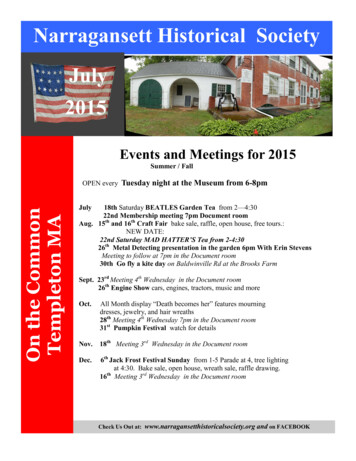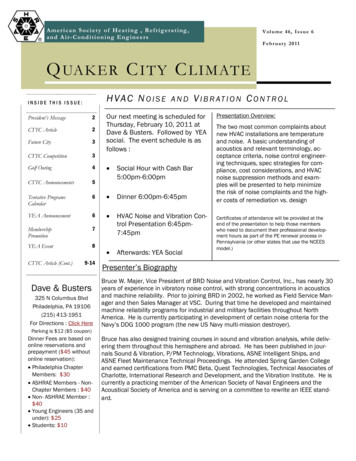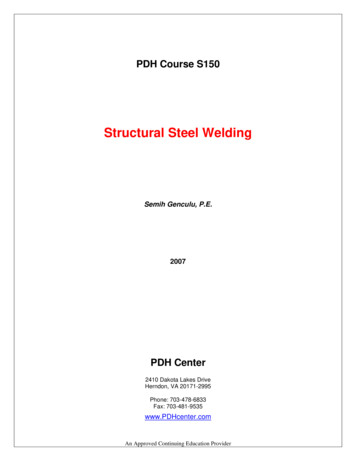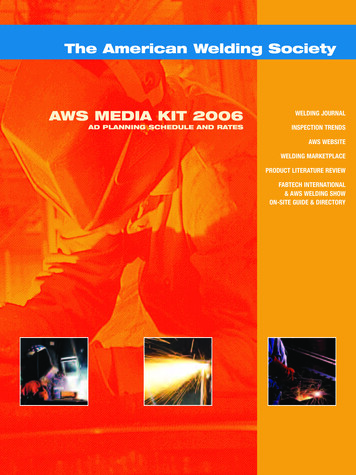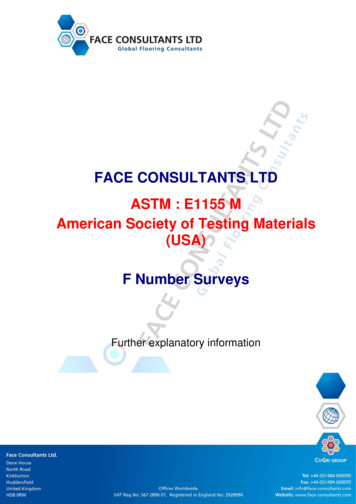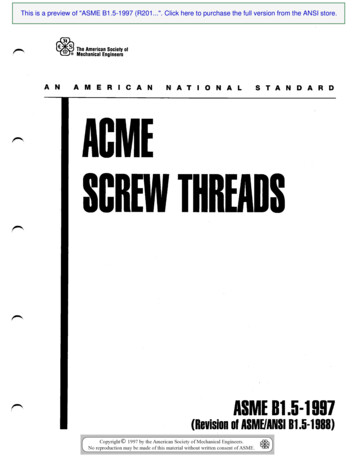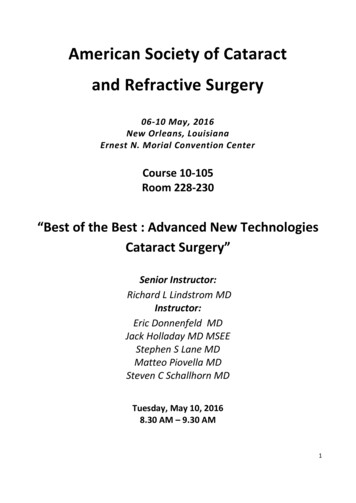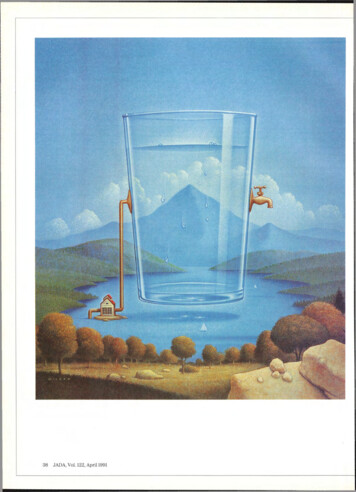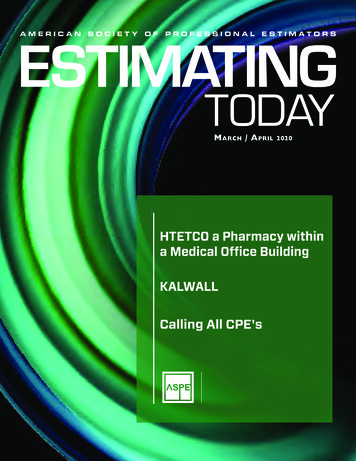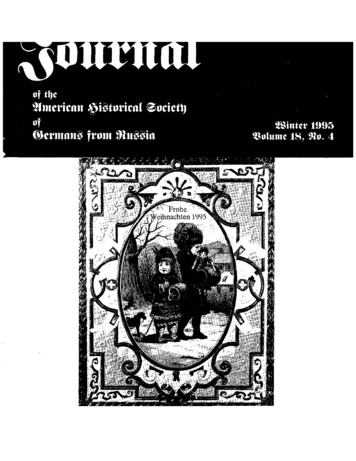
Transcription
Editor CHRISTINE CLAYTON AHSGRHeadquarters, Lincoln, NebraskaEditorial BoardIRMGARD HEIN ELLINGSONBukovina Society, Ellis, KSARTHUR E. FLEGELCertified Genealogist, Menio Park, CAADAM GIESINGERUniversity of Manitoba, Canada,emeritusNANCY BERNHARDT HOLLANDTrinity College, Burlington, VTWILLIAM KEELUniversity of Kansas, LawrenceOn the cover:The cover picture appeared in Volk aufdem Weg 12, December 1983. It is aMennonite Christmas picture from 1980(from "Heritage Remembered" by G,Lohrenz). Used with permission.PETER J.KLASSENCalifornia State University, FresnoTIMOTHY KLOBERDANZNorth Dakota State University, FargoGEORGE KUFELDTAnderson University, Indiana, emeritusLEONAPFEIFERFort Hays State University, Kansas,emeritusHELMUT SCHMELLERFort Hays State University, Kansas,emeritusThe Journal of the American Historical Society of Germans from Russia is published quarterly by AHSGR.Members of the Society receive a quarterly Journal, Newsletter, and an annual genealogical publication, Clues.Members quality for discounts on material available for purchase from AHSGR. Membership categories are:Individual, 40; Family, 40; Contributing, 50; Sustaining, 100; Life, 500. Memberships are based on acalendar year, due each January 1. Dues in excess of 40 may be tax-deductible as allowed by law. Applicationsfor membership should be sent to AHSGR, 631 D Street, Lincoln, NE 68502-1199.The Journal welcomes the submission of articles, essays, family histories, anecdotes, folklore, bookreviews, and items regarding all aspects of the lives of Germans in/from Russia. All submissions are subject toreview by the Editorial Board. Manuscripts should be typed double spaced with endnotes. Computer fan-foldpaper should be separated before mailing. If written on computer, please include a diskette containing a copy ofthe computer file. We can accept IBM-compatible ASCII or WordPerfect files. Our style guide is TheChicago Manual of Style, 14th ed. revised (Chicago: University of Chicago Press, 3 993).Please indicate in your cover letter whether you have photos or illustrations to accompany your article. Ifyou wish your submission returned to you, please include a stamped, self-addressed envelope with adequatepostage. Unless you instruct us otherwise, submissions not published in the Journal will be added to theAHSGR Archives.The International Foundation of AHSGR is a non-profit organization which seeks funds to support the needsof the many operations of the Society. The Foundation accepts monetary gifts, bequests, securities, memorialgifts, trusts, and other donations. Gifts to the Foundation may be designated for specific purposes such aspromoting the work of the Aussiedler Project gathering information from German-Russian emigrants recentlyarrived in Germany, the AHSGR/CIS Project for research in Russia, or supporting the Society's library orgenealogical work; gifts may also be designated for use where most needed. Alt contributions help further thegoals of AHSGR: to gather, preserve, and make available for research material pertaining to the history ofGermans from Russia.For information and to make contributions, contact the International Foundation of the American HistoricalSociety of Germans from Russia, 631 D Street, Lincoln, NE 68502-1199. Telephone: (402) 474-3363. Fax:(402) 474-7229. E-mail: ahsgr@aol.com. Donations to the International Foundation are tax deductible asallowed by law.Opinions and statements of fact expressed by contributors are their own, and do not necessarily reflect the views of the Society, the Foundation, the Editor, ormembers of the Editorial Board, who assume no responsibility for statements made by contributors.Published by theAmerican Historical Society of Germans from Russia631 D Street Lincoln, NE 68502-1199 Phone 402-474-3363 Fax 402-474-7229 E-mailahsgr@aol.com Copyright 1995 by the American Historical Society of Germans from Russia. All rights reserved. Printed in the U.S.A.ISSN 0162-8283 10.00 U.S.
CONTENTSGROWING UP IN CHICAGO: MEMORIES FROM THE SON OF VOLGA GERMANS. 1John GorrWHEN EVERYONE I LOVED, OR TRIED TO (A CHRISTMAS EVE VISIT, 1968). 9Ronald VosslerOUR JOURNEY TO RUSSIA: FINDING THE THREE "LOST" BROTHERS . 13Floyd L. SeherAHSGR LIBRARY POLICIES . 30NEW ADDITIONS TO AHSGR LIBRARY. 31Shield Roche, AHSGR Librarian, and Michelle Crumley, Librarian AssistantAUDIO-VISUAL MATERIALS AVAILABLE FROM HEADQUARTERS . 37Shiela Roche, AHSGR Librarian, and Michelle Crumley, Librarian AssistantA SHORT HISTORY OF THE BESSARABIAN GERMANS . 41Elvire Necker-EberhardtPROTECTING OUR MEMORIES . 45Christine FeniakAHSGR Journal/Winter 1995
This map shows Jefferson Park, the neighborhood in Chicago where John Gorr grew up. Notice St. Lucas Cemetery wheremany Lutheran German-Russians are buried. This extract is from the Rand McNally Chicago & Cook County Street Finder,1992.AHSGR Journal/Winter ]995
GROWING UP IN CHICAGO: MEMORIESFROM THE SON OF VOLGA GERMANSJohn GorrI was born in Chicago, Illinois, at home, in a neighborhoodon the northwest side of the city called Jefferson Park. Iwas delivered by a midwife, that's the way things weredone in those days. My mother's name was Amalia (18941946), her father and mother were Heinrich Pfeifer (18681918) and Christina Lutzow (1867-1948). My mom hadone sister, Dorothea and one brother. Henry, who died inRussia when he was five years old.My mother and her sister immigrated from Russia withtheir parents and arrived in Philadelphia, Pennsylvania,aboard the SS Merion on 19 June 1911, out of Liverpool,England.My grandfather Heinrich Pfeifer was one of thoseimmigrants who talked about working and saving so hecould go back to Schwed, Russia, as a rich man. He savedhis money and turned his American dollars into Russianrubles. As family legend recalls, he had a trunk full ofrubles, when the 1917 Bolshevik revolution wiped out hisdreams of returning to the ancestral village as a rich man.I never knew my grandfather or my aunt DorotheaPfeifer Hoppe (1898-1918) because they died in the 1918flu epidemic, near the end of World War I, within four daysof one another. My aunt left a nine month old son, whommy parents and grandmother cared for and raised until hisfather got over his grief and remarried. When the fatherremarried he moved to Minnesota and took his young sonwith him. My grandmother missed her younger daughter'sson, but she had plenty to take his place as she lived withmy folks, who eventually had eleven children.My mother never talked much about Russia except totell how she liked to go swimming in the nearby river,John Gorr is a retired union carpenter, who was encouraged by hiswife and children to tell his story of growing up as a legacy to hisgranddaughter, Amandalyn. He is a descendant of Volga Germansfrom Schwed who settled in She Jefferson Park neighborhood ofChicago, Illinois. He lives with his wife, Carolyn Swenson Gorr, inPalatine, Illinois. Tisey have been married forty years and havethree. adult children, Christopher, Eric, and Carrie.A member of the Northern Illinois Chapter of AHSGR, he wasrecently involved in the chapter's project of extracting the names ofGerman Russians from the record's of the John V. May FuneralHome in Jefferson Park, Illinois.which was very clean, and that the family had a farm withmany horses.My father, Gottfried Gorr (1885-1984), also was bornin Schwed, Russia. His father's name was Casper Gorr andhis mother was Elizabeth Kraemer. His parents also werefarmers and, from what I have heard, they were fairlyprosperous farmers, as they not only owned horses but hadcamels as well. Casper Gorr was the village carpenter also,and when someone died he made the coffin. He also madefurniture and wagons for the townsfolk. I always felt that Iinherited his genes because early in my life I made a lot ofitems with hammer, nails, and wood.My dad had three sisters and, I believe, three brothers.His youngest sister, Sofia Gorr Hoppe, emigrated toAmerica with him aboard the SS Friesland out ofLiverpool, England, bound for the port of Philadelphia,Pennsylvania. They arrived 20 March 1910 and settled inthe growing community of Germans from Russia withinthe Jefferson Park area of Chicago.We have always heard the story, in our family, thatCasper and Elizabeth Gorr died of starvation, victims of theBolshevik revolution. Some of my dad's family were sentto Siberia. For some reason he was able to communicate,by letters, with one sister, Anna Katharina. These letterswere smuggled out of Russia by some secret grapevine thatsupposedly went through Turkey. Through these letters helearned that his sister had three daughters, that they weremarried and had families of their own. When she died in1974 at the age of ninety-six, her daughters had a photomade showing Anna in her coffin with her daughters allaround. Her girls were named: Dorothea (born 1900). Sofie(born 1903), and Amalie (born 1912). My dad didn't talktoo often about the old country, probably because he wassad to think what happened to all of the friends andrelatives who remained (here.When Russia changed its mind about German autonomy, my dad was drafted into the Tsar's Army. He waseighteen or nineteen years old during the Russian-JapaneseWar. He told me that he was a prison-camp guard and thathe manned a machine gun. He also said, when he got out ofthe army, there was no land for him to work, asAHSGR Journal/Winter 1995
he was the youngest son in a tradition that followed primogeniture, where the first son inherited all. He decided toemigrate as soon as he earned enough money for a ticket toAmerica. Other villagers had preceded him and had writtenletters home telling of job opportunities and the possibilityof a better future.He always felt an indebtedness to his new country, andif any of his friends or neighbors complained aboutsomething with the American government, he would bequick to remind them of the conditions they left in Russia.He also had a high regard for President Franklin D.Roosevelt.My folks knew each other in Schwed and renewed theirfriendship after they came to America, They were marriedat St. John's Lutheran Church (Missouri Synod) atMontrose and Lavergne in Chicago, Illinois, on 23 March1913. My mother said their wedding reception lasted threedays and was not unlike the traditional celebrations inSchwed. She had just turned eighteen in De-The author's parents, Gottfried and Amalia Pfeifer Gorr, ontheir wedding day. They had a traditional Russian-Germanwedding reception—lasting three days.AHSGR Journal/Winter 1995cember and my dad was twenty-eight when they married,My mother was a homemaker, who had additional helpfrom my grandmother, and my father did all kinds of workto support his growing family. One of the jobs he had,during the 1918 flu epidemic, was helping out at the JohnV, May Funeral Home because so many people died duringthat period that the undertakers were overwhelmed withwork.My parents, Amalia and Gottfried, had eleven children,eight of whom survived into adulthood. The first child,Gottfried, Jr. died 30 May 1915 when he was fifteenmonths old. He had contracted measles, which turned into"tubular pneumonia" according to his death certificate. Theother children were Heinrich (Henry) (1915-1992); David(1917); Alexander (1919); Gottfried (#2) Wilhelm(1927-1927);Wilhelm(#2)(1928);Amalia(Molly) (1931); and Bertha (1933). I can see where Pa hadto hustle to take care of such a large family.Life was tough during the Great Depression and therewas little work for my father, so Ma found part time workas a cleaning lady for a well-to-do family named Lee, inEvanston, Illinois. Mrs. Lee gave my mother the clothingher kids had outgrown, which came in handy for all of uskids at home.My oldest brother, Henry, worked at Chicago Transformer during the mid-Depression years and gave his earnings to Ma up until the time he married and left home.When Dave and Alex began working they, too, had to contribute to the family's welfare. My older brothers were ahelp to my parents and an additional reason why our familysurvived that dark time in America's history.My grandmother (or as we called her, Mutter), Christina Lutzow Pfeifer (1867-1948), lived with our familyfrom 1918, when she was widowed, until she died. She wasborn in Enders, Russia, and used to tell me stories aboutthe Volga area and of the bitter-cold winters, wheretemperatures would reach forty and fifty below, and also ofthe lush farms they had on the Russian steppes.When I was a young boy and playing in the yard, Istarted to crawl through the hedge in front of the family'stwo-flat and was hit by a kid on a bicycle coming down oursidewalk. The pedal of the bike ripped through my chinand left it flapping. My grandmother gathered togethersome of the herbs she had brought with her from Russia,which were then growing in our back yard, and mixedthem together with flour into a poultice. She placed thepoultice on my chin and held it in place for about threedays (or so it seemed to this small boy). The scar I have
today would be envied by the finest surgeon, one can barely detectit.When I was four or five years old my dad took me over to theconstruction site of Eden's Evangelical Lutheran Church inJefferson Park at Gunnison and LeClaire. The workmen weretrimming the inside of the church. I remember being in awe of theworkmen who were assembling the fine oak-work and installingthe large pipe organ. Each time I attend a fu
V, May Funeral Home because so many people died during that period that the undertakers were overwhelmed with work. My parents, Amalia and Gottfried, had eleven children, eight of whom survived into adulthood. The first child, Gottfried, Jr. died 30 May 1915 when he was fifteen months old. He had contracted measles, which turned into
